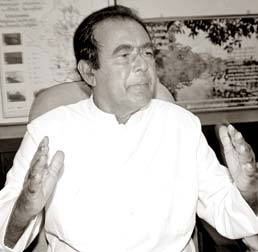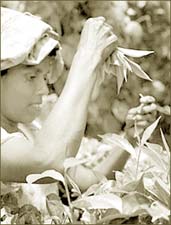Prospects bright for tea, rubber and coconut
UDITHA KUMARASINGHE
|

Plantations Industries Minister D. M. Jayaratne
|
Plantations Industries Minister D. M. Jayaratne said the Ministry
has implemented a series of programs to elevate the cultivation of the
three main export crops by providing relief and assistance.
Q: What kind of measures have been taken to overcome the problems
faced in the tea, rubber and coconut industries?
A: At present, there are no serious problems regarding tea, rubber
and coconut industries. There was a slight decrease in the prices of tea
and rubber during the final quarter of 2008 and the first quarter of
2009. The Ministry has brought tea and rubber prices to considerable
levels following discussions with ambassadors of leading tea and rubber
purchasing countries.
We earn a satisfactory income from tea and rubber exports. In
addition, problems in the coconut industry have also been sorted out.
Therefore, no problem has arisen regarding tea, rubber and coconut
industries at the moment.
Q: Can you comment on the progress achieved by tea, rubber and
coconut industries due to moves taken by the Government to promote these
industries?
A: Tea and rubber production has gone up. A kilo of tea is sold at
Rs.360 while a kilo of high quality tea has been sold at Rs.720. A kilo
of rubber is sold at Rs.385.
When the local rubber prices had dipped, Rs.450 million was allocated
to ensure a stable price of Rs.150 per kilo of rubber by providing
relief to those who engaged in the rubber plantation sector.
The price of a coconut which was Rs.13 or Rs.14 has risen to between
Rs.18 to Rs.22. Therefore, the Government has been able to stabilise the
prices of tea, rubber and coconut by creating an environment conducive
to those who are engaged in these sectors to enjoy good living
conditions.
Q: The import of palm oil has caused an adverse impact on the local
coconut oil industry. What are the measures taken by the Ministry to
control this situation?
A: According to statistics, the country needs 176,000 metric tons of
coconut oil. Of this amount, only 76,000 metric tons of coconut oil are
produced locally. In order to fill the balance requirement of coconut
oil, nearly 100,000 metric tons of palm oil have to be imported. The
prices of palm oil have dropped worldwide.
 |
 |
 |
| Plucking
tea leaves |
Rubber
cultivation |
Coconut -
a variety of uses |
Under these circumstances, difficulties have been encountered in
selling locally manufactured coconut oil. As a result, coconut oil
manufacturers have faced severe hardships. In order to provide immediate
relief measures to coconut oil manufacturers, the Government has
increased the price of a litre of imported palm oil by Rs.60.
This would enable them to obtain a fair price for their coconut oil
production. The Ministry intends to increase the local coconut oil
production systematically upto 200,000 metric tons and completely stop
the import of palm oil to Sri Lanka in future. The Ministry is
discussing with the coconut oil manufacturers to turn this goal into a
reality by providing them facilities.
Q: Fragmentation of coconut lands has led to a collapse of the local
coconut industry. What are the initiatives taken by the Ministry to
overcome this situation?
A: The President in the 2008 Budget promised to implement certain
regulations to ban the fragmentation of coconut lands over five acres.
We have sent this proposed bill to the Legal Draftsman’s Department. But
they have not sent the amended bill.
As soon as we receive this bill, it will be submitted to Parliament.
But the Ministry has banned the fragmentation of coconut lands less than
10 acres. But we have received information that the fragmentation of
coconut lands is continuing in certain areas.
This is illegal. However, these lands cannot be registered and legal
action can be taken against lawyers and the Notaries Public who have
been involved in registering these lands. According to the law there is
a possibility to cancel the title deeds of these fragmented lands.
Investigations are being conducted to take legal action against
persons who have fragmented coconut lands illegally.
The fragmentation of coconut lands less than 10 acres has been
stopped to a large extent.
We have also formulated a special program to promote coconut
cultivation throughout the country. According to this program, five
coconut saplings each will be distributed among 3.5 million families
free of charge.
The objective is to use the harvest of two coconut trees for their
consumption and export the balance. The successful implementation of
this program would facilitate people engaged in various industries to
utilize various parts of the coconut tree.
The areas coming under the Coconut Triangle in Kurunegala and Matara
in the Southern Province, coconut husks and shells are largely wasted
without using for any purpose. Therefore, the Ministry has also
commenced a program to register those willing to collect coconut husks
and shells, as agents and start various industries utilizing coconut
husks, shells and coir. This would help earn a good income while
generating a large number of employment opportunities in rural areas.
The Ministry will provide facilities to commence these industries.
Arrangements have been made to grow 10 million coconut trees. This
program has commenced in Mannar, Ampara, Kalmunai, Trincomalee and
Batticaloa districts. In addition, arrangements have been made to
distribute coconut saplings in the Jaffna district as well.
Q: What are the incentives provided by the Government to encourage
tea, rubber and coconut cultivators?
A: The Government has formulated a program to provide a 50 kilo bag
of fertilizer for the tea cultivation at Rs.1,000 to tea small holders.
Normally, a bag of this fertilizer is sold in the local market at
Rs.6000.
The Government has given a Rs. 200,000 subsidy to grow a hectare of
tea. Arrangements have been made to provide tea saplings and
instructions and enable them to purchase tea leaves at reasonable rates.
The Ministry has recommended a fixed price to prevent tea factory
owners from purchasing tea leaves at low prices. The Ministry has
provided fertilizer and high quality rubber saplings to promote the
rubber industry.
A program has commenced to sell outdated rubber logs at higher prices
to countries like Singapore. The Government has offered good prices to
rubber smallholders. Measures have also been taken to promote the
coconut industry.
The Ministry provides a Rs.100 worth coconut sapling at Rs.10 to
coconut cultivators. Coconut cultivators have also been provided
fertilizer and instructions to develop their industry.
The Ministry will also assist those engaged in the production of
various coconut based products by introducing new machinery and
equipment.
The Ministry has imported a special variety of coconut saplings from
China which can be grown in upcountry. These coconut saplings have been
planted in Haggala and Nuwara Eliya.
A new coconut cultivation program will be introduced to upcountry
areas following the progress achieved by this project. |



